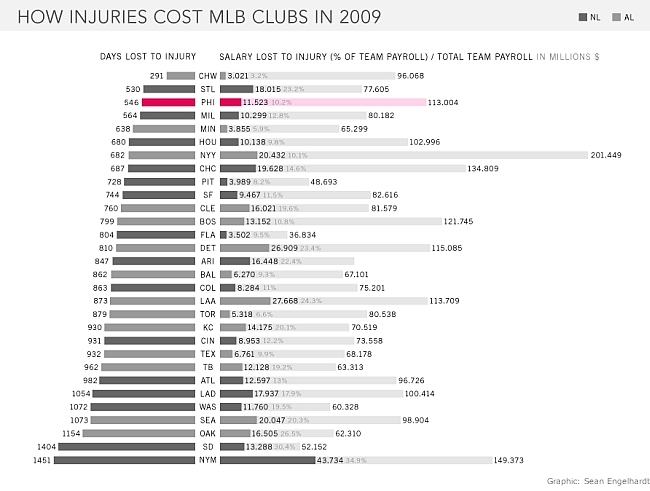BP Comment Quick Links

 | |
November 13, 2009 The 2009 Dick Martin AwardUnsung Heroes
Each year at Baseball Prospectus, we give out the Dick Martin Award for the best medical staff. The Award is based on several objective factors, and is designed to bring attention to one of the least noticed but most valuable parts of a winning baseball operation. While all 30 teams' units work long hours for a fraction of the pay that their charges make and are well qualified, working their way up through the minors in the same way as players, only one of these 30 can win the Award. This year, the value brought by the winning staff is clear, because in addition to this Award, they have a couple pennants and a ring. In the past, DMA winners have been something of a leading indicator, with teams like the Brewers and Rays making playoff runs behind excellent health and improving young teams. This year, Scott Sheridan's Phillies win the Dick Martin Award after a second straight World Series appearance. The health of the team and, just as important, the management of the injuries they did have helped the Phillies get to baseball's pinnacle in both seasons. Facing challenges like their star player having an untested surgery, keeping a struggling pitcher healthy enough to stay on the mound, monitoring the workload of their young ace, and integrating new players with their own injury histories, the Phillies kept their team on the field and productive throughout the 2009 season. Of course, this isn't a fluke. The Phillies three-year and five-year averages for both days and dollars lost to the DL are among the many reasons this team is taking home the trophy this season. In just the third year after taking over from long-time trainer Jeff Cooper, Sheridan's staff is a relatively new one, but it's already considered one of the best in the business. Sheridan was able to hold on to the rehab successes that Cooper's reputation was built on while focusing on prevention and injury management.  As Sean Engelhardt's graphic so clearly shows, the Phillies are doing more than keeping players healthy-they're saving their team and adding wins and dollars to the bottom line. In fact, for many teams, it could be the difference between making the playoffs or not. While MLB has thrown over a billion dollars away on just injured pitchers alone over the last five years, almost nothing has been done to assist the overworked and undercompensated medical staffs. Budgets haven't changed. Few teams have more than three people on staff. Players continue to be far-flung and self-directed in the offseason. It's a challenge that Scott Sheridan, Dr. Michael Ciccotti, Mark Anderson, and Dong Lien face every day. It's also one that, in 2009, they did better than any other team. Congratulations to the 2009 Philadelphia Phillies' medical staff on this Award from all of us here at Baseball Prospectus. It might be a small thing next to the two pennants and that World Series ring they won, but they understand that it's a part of those as well.
|
Will, can you explain how Sean Englehardt's chart relates to the criteria you use to select the award? I ask, because the measures he includes appear to show the White Sox leading in days lost to injury and percentage of salary lost to injury; other teams, including the Cardinals, Brewers, and Marlins, lead the Phillies in one category or another. How does the visual display of this data enhance your argument that the Phillies had the most successful medical staff?
I can only venture a guess that it has everything to do with their success. The Cards were arguably just as successful by making the playoffs, but the difference in days lost is pretty marginal. Every other team at the top before we get to the Yankees, obviously, has little to no actualy success in 2009.
But if the argument is who kept their team the healthiest, I have no idea how Herm Schneider and the White Sox don't win this "award."
The award also has a three- and five-year average component to it. After we look at those five numbers, I sit down with six of my top medical advisors and see if we can come to a consensus, which was relatively easy this year. Schneider and the Sox got major consideration, no surprise since they won a couple years ago.
Thanks for the clarification, Will.
I assume that the Royals have to come out near the bottom of your rankings, even though they're in the middle of the days/dollars chart. Where do their particular kind of failings fit into your evaluation process?
We just talk about the potential winners. It really came down to the Phillies, Cards and Sox this year. All would have been deserving winners, but the Cards were hurt by their 3-yr avg, which was in large part the loss of pitchers. They take on a lot of risk, so if there was some sort of risk-adjustment that would be consistent and valid, they'd get a lot of points there.
Which teams have been trending better over their last three years, but perhaps have a poorer five year trend?
Good question ... maybe I can get Sean to do another of his cool-as-heck graphs on that.
That would be great. It'd be interesting to see which teams have gotten better or worse over the last three years and have a chance of improving or lowering their ranking.. and perhaps, from such a list, factors can be identified that show what good teams do well and poor teams do poorly etc.